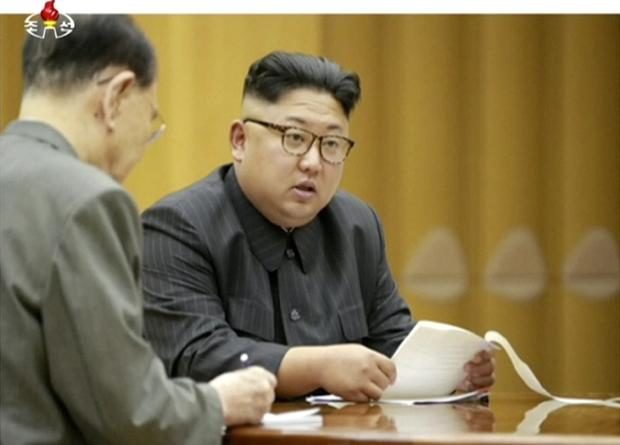N. Korea blames US for tensions in rare UN talks

This image made from undated video of a news bulletin aired by North Korea’s KRT on Sept. 3, 2017, North Korea’s leader Kim Jong Un holds the Presidium of the Political Bureau of the Central Committee. North Korean state television said on Sunday, Sept. 3, 2017, the country has successfully conducted a test of a hydrogen bomb that is meant to be loaded onto an intercontinental ballistic missile. Independent journalists were not given access to cover the event depicted in this photo. (Photo by KRT via AP Video)
North Korea blamed US “nuclear blackmail” for soaring tensions over its weapons program following rare meetings with a senior UN official, but agreed to regular communication with the organization, state media said Saturday.
Jeffrey Feltman arrived in Beijing Saturday after wrapping up a five-day visit to Pyongyang aimed at defusing the crisis, just a week after North Korea said it test-fired a new ballistic missile capable of reaching the United States.
His trip—the first by a UN diplomat of his rank since 2010—saw him meet Foreign Minister Ri Yong-Ho and vice foreign minister Pak Myong-Kuk as well as medical facilities supported by the UN, the North’s state news agency KCNA said.
“At these meetings, our side said the US policy of hostility toward the DPRK (North Korea) and its nuclear blackmail are to blame for the current tense situation on the Korean peninsula,” the report said.
It added that the North had agreed with the UN “to regularize communications through visits at various levels.”
The report did not mention any meetings with leader Kim Jong-Un, who has ramped up his impoverished nation’s missile and nuclear program in recent years in order to achieve Pyongyang’s stated goal of developing a warhead capable of hitting the US mainland.
Feltman, the UN’s undersecretary general for political affairs, visited the country just after the United States and South Korea launched their biggest-ever joint air exercise.
Pyongyang reiterated its view that these manoeuvers were a provocation on Saturday, accusing the drills of “revealing its intention to mount a surprise nuclear pre-emptive strike against the DPRK”, using the acronym for the country’s official name.
The UN Security Council has hit the isolated and impoverished North with a package of sanctions over its increasingly powerful missile and nuclear tests, which have rattled Washington and its regional allies South Korea and Japan.
Early Saturday Feltman flew to Beijing, a key transit point with the North, and left the city’s airport without speaking to reporters.
China, which is Pyongyang’s sole major diplomatic and military ally, has called on the United States to freeze military drills and North Korea to halt weapons tests to calm tensions.
The Chinese foreign ministry on Saturday published a speech from four days ago by foreign minister Wang Yi in which he warned that the Korean Peninsula “remains deeply entrenched in a vicious cycle of demonstrations of strength and confrontation.”
“The outlook is not optimistic,” Beijing’s top diplomat added.
‘Emotion-charged days’
Pyongyang ramped up already high tensions on the Korean Peninsula at the end of November when it announced it had successfully test-fired a new intercontinental ballistic missile (ICBM), which it says brings the whole of the continental United States within range.
Analysts say it is unclear whether the missile survived re-entry into the earth’s atmosphere or could successfully deliver a warhead to its target—key technological hurdles for Pyongyang.
US President Donald Trump has engaged in months of tit-for-tat rhetoric with Kim, pejoratively dubbing him “Little Rocket Man” and a “sick puppy.”
The North on Saturday released photographs of Kim on the summit of the country’s highest peak, the fabled 2,750-metre Mount Paektu, which he climbed to ponder recent successes in his drive for nuclear weapons statehood.
State media said the young leader, who was pictured strolling across the snow covered peak sporting a heavy black coat, fur hat and buffed leather shoes, had climbed the “sublime mountain of revolution”, which is on the border with China.
Described in the fulsome language of Pyongyang’s mouthpiece as “the peerlessly illustrious commander who controls the nature”, Kim was particularly pleased with the inclement weather and used the opportunity to muse on his recent military feats.
“The respected Supreme Leader gave a familiar look for a while at the dizzy cliffs and the sea of trees,” the report said, describing him dwelling on the “emotion-charged days when he realized the great historic cause of completing the state nuclear force without yielding even a moment.”
Mount Paektu is considered a sacred place in Korean folklore and plays a central role in the propaganda glorifying the Kim family.
Officially, Kim’s father Kim Jong-Il was born on its slopes in 1942, though independent historians say he was actually born a year earlier and in the Soviet Union, where his own father was in exile. /jpv
RELATED STORY
UN envoy bound for NoKor as tensions soar














